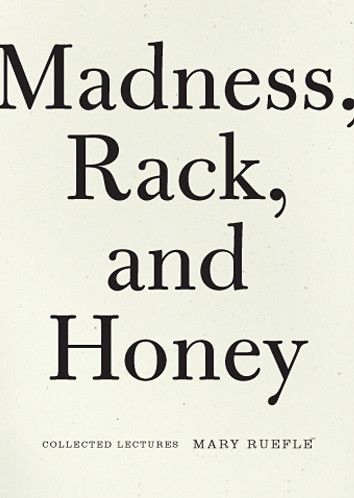In the weeks leading up to the February 28 announcement of the 2012 NBCC award winners, Critical Mass highlights the thirty finalists. Today in our series, NBCC board member David Haglund offers an appreciation of criticism finalist Madness, Rack, and Honey (Wave Books) by Mary Ruefle.
 Anyone who’s ever had to give a toast at a wedding or an anniversary or a birthday knows that occasional writing—writing, that is, for a particular occasion—is hard. You want to say something thoughtful and sincere, but you must also attend to the formalities and niceties of the event. The trappings and conventions can be helpful constraints, but they can also drain every last sap of individuality from your carefully chosen words. Even a very good toast will probably sound quite a bit like every other toast you’ve ever heard.
Anyone who’s ever had to give a toast at a wedding or an anniversary or a birthday knows that occasional writing—writing, that is, for a particular occasion—is hard. You want to say something thoughtful and sincere, but you must also attend to the formalities and niceties of the event. The trappings and conventions can be helpful constraints, but they can also drain every last sap of individuality from your carefully chosen words. Even a very good toast will probably sound quite a bit like every other toast you’ve ever heard.
Criticism is a kind of occasional writing, and its own unofficial rules, however salutary, can similarly choke much of the life from words. One of the amazing things about the essays or lectures or pieces—call them what you will—in Mary Ruefle’s Madness, Rack, and Honey, a finalist this year for the NBCC Award in Criticism, is how free from those strictures they feel, how entirely outside such familiar grooves they manage to be. It may help that they began in a slightly unusual way, as lectures delivered to graduate students and meant to be informal, which Ruefle wrote down only because writing, for her, is “more natural than speaking.”
But the nature of those occasions doesn’t go far in explaining the wonderful waywardness of Ruefle’s thoughts on her various subjects. Consider the passage in “On Sentimentality” where Ruefle decides to tell the listening graduate students what her fellow poet-teachers “talk about when they get together informally.”
They talk about cats. They exchange cat stories and show each other photographs of their cat-pets. I can’t think of anything more sentimental than to own a cat, but that’s only because I personally abhor them, though I am willing to admit that I am particularly fond of kittens, a form of cat even more sentimental than the real thing. I have noticed that when a cat has kittens, my friends give away the kittens and keep the cat. Which has always baffled me: in the same situation, I would give the cat away and keep the kittens. Which is more sentimental?
She then goes on to examine the poem “Chaplinesque” by Hart Crane, which features, crucially, a kitten. “The poem may be sentimental,” she says, “but Crane insists that if we fail to be moved by the kitten, something is terribly wrong.”
In the introduction to the book, Ruefle explains that she didn’t set out to write it, and, what’s more, she had “always looked askance at writing on writing.” But she knows that ultimately “writing is writing,” and she sees Madness, Rack, and Honey as “my having learned, step by step, how to think and talk about poetry in ways and terms that are my own.” They are certainly no one else’s.
The title of the essay that gives the book its name came to Ruefle “in a dream,” and in that essay Ruefle goes on to “publicly interpret” that dream with the same genuinely unique intelligence that, elsewhere in the book, she applies to poems and philosophical treatises and advertising copy. “Honey” is poetry, the sweet and tempting result of serious labor, and the “rack” is a word for that very labor, generally difficult and sometimes torturous. “Madness” may be the source of poetry or the result of it or something experienced in its making: “Madness is madness because it is inexplicable.” At the end of the essay she quotes Darwin, who said “the more I think the more bewildered I become.”
Ruefle has a way with quotations as well as aphorisms. Often she has a way with both at once, as when she indelibly paraphrases Gaston Bachelard: “We begin in admiration and we end by organizing our disappointment.” I could quote this book all day, and I wouldn’t feel bad about it. I would begin with lines from the title essay, lines that might apply to the book—to poetry? To literature?—as a whole:
The only purpose of this lecture, this letter, my only intent, goal, object, desire, is to waste time. For there is so little time to waste during a life, what little there is being so precious, that we must waste it, in whatever manner we come to waste it, with all our heart.
Links:
New York Times review of Madness, Rack, and Honey
Rumpus review

